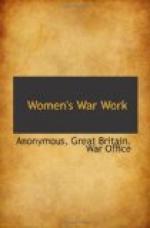[Illustration: “Somewhere in France”]
In the Cathedral the Rev. Dr. Wallace Williamson, Dean of the Order of The Thistle, said: “We are assembled this day with sad but proud and grateful hearts to remember before God a very dear and noble lady, our beloved sister, Elsie Inglis, who has been called to her rest. We mourn only for ourselves, not for her. She has died as she lived, in the clear light of faith and self-forgetfulness, and now her name is linked forever with the great souls who have led the van of womanly service for God and man. A wondrous union of strength and tenderness, of courage and sweetness, she remains for us a bright and noble memory of high devotion and stainless honor.... Especially today, in the presence of representatives of the land for which she died, we think of her as an immortal link between Serbia and Scotland, and as a symbol of that high courage which will sustain us, please God, till that stricken land is once again restored, and till the tragedy of war is eradicated and crowned with God’s great gifts of peace and of righteousness.”
The National Union of Women’s Suffrage Societies also sent the Millicent Fawcett Unit, named after its honoured President, to Russia in 1916 to work among the Polish refugees, especially to do maternity nursing, and work among the children.
In February a Maternity Unit started work in Petrograd. With an excellent staff of women doctors, nurses and orderlies, the little hospital proved a veritable haven of helpfulness to the distressed refugee mothers. It soon established so good a reputation for its thorough and disinterested work that the help of the workers was asked for by the Moscow Union of Zemstovos (Town and Rural Councils) for Middle Russia and Galicia.
In May the Millicent Fawcett Hospital Units were sent out and at Kazan on the Volga a badly needed Children’s Hospital for infectious diseases was opened. The only other hospital in the place was so full that it had two patients in each bed. They had a fierce fight against diphtheria and scarlet fever, which in many cases was very bad, and they succeeded in saving most of the children, who would certainly have died in their miserable homes.
In the summer, the Units took over a small hospital at Stara Chilnoe, a district without a doctor, and they treated not only refugees, but the peasants who came in daily in crowds from the surrounding districts. Other Units of the same kind were started in remote districts and in summer a Holiday Home at Suida was run to which the women and children could come from the Petrograd Maternity Hospital for a rest. They also took charge of two hospitals, temporarily without any medical staff, in a remote part of the Kazan district, where they were objects of the most intense curiosity.
The interpreters were kept busy answering questions about the ages, salaries and husbands of the staff, and the nurses’ wrist watches roused great excitement.




